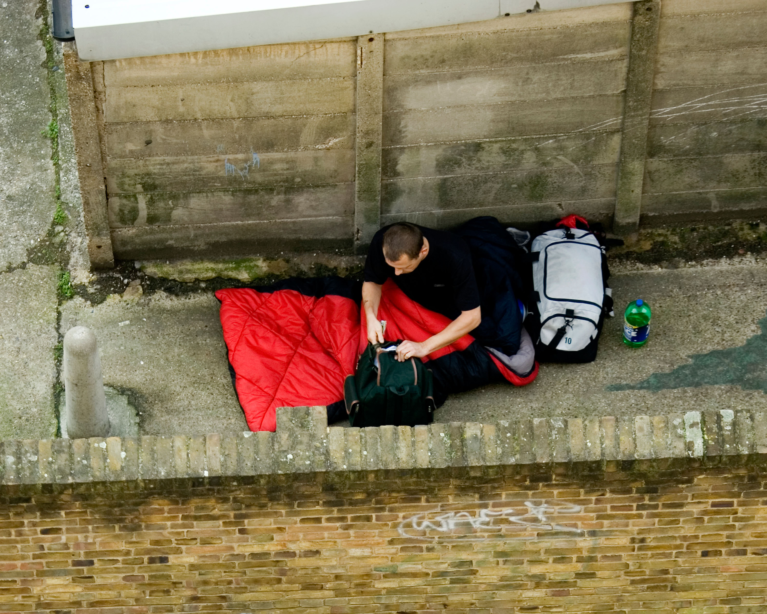Homelessness and public spaces / Hostile environment
Liberty and rights groups urge councils not to report homeless people to immigration enforcement
Posted on 05 Nov 2019
A letter to the chief executives of all Greater London local authorities, Local Government Association, London Councils, Greater London Authority, Council leaders
Dear Chief Executive,
We write to express our renewed concerns for the rights of migrant and refugee rough sleepers in the context of Brexit and the government’s ongoing ‘hostile environment’ for migrants. We are writing this open letter to local authorities in relation to the Home Office’s Rough Sleeping Support Service (RSSS).
Background
The number of people sleeping rough in Greater London has increased year-on-year over the past decade. People from a migrant or refugee background make up around half of all rough sleepers in London [1].
Many migrants and refugees are effectively forced to sleep rough. This is due to restrictions to their entitlement to housing assistance and welfare benefits and the difficulty of obtaining independent advice that could help them resolve their immigration status and access support services. There remains a severe lack of statutory and voluntary-sector housing provision for migrant and refugee rough sleepers in London [2].
Crucially, statutory and other agencies have often failed to take a rights-based, person- centred approach to working with migrant and refugee rough sleepers, with enforcement and removal taking priority over advice and support. A culture of gatekeeping and ‘presumed non-entitlement’ has led to many migrant and refugee rough sleepers being refused support to which they are entitled.
As the Home Office’s ‘hostile environment’ policies have led to an increase in street homelessness, information sharing between local authorities, commissioned outreach services and immigration enforcement teams has damaged trust between homeless people and support services.
The Rough Sleeping Support Service
The Rough Sleeping Support Service (RSSS) was set up late 2018 by the Home Office and the Ministry of Housing, Communities and Local Government as part of the latter’s Rough Sleeping Strategy. The Home Office claims the RSSS exists to ‘help non-UK nationals sleeping rough resolve their immigration cases and access the support that they need’.
It is our view that the RSSS makes no sense from a support perspective. It includes no additional resources to respond to subject access requests or expedite applications and no funding to help migrant and refugee rough sleepers access independent immigration advice or accommodation.
Moreover, information obtained through Freedom of Information requests suggest that the RSSS is being used to co-opt councils and charities into the delivery of immigration controls.
The Home Office wants information about rough sleepers to be shared on the basis of ‘public task’ [3] rather than on the basis of informed consent [4]. An initial proposal for data to be shared on the basis of informed consent was rejected by the Home Office because of concerns that rough sleepers might withdraw their consent.
The Home Office appears to want to delegate the gathering of information about rough sleepers under ‘public task’ to local authorities and some charities. This may be in breach of data protection laws. We are extremely concerned that the RSSS represents an attempt to circumvent consent-based data sharing and disempower homeless people with respect to their data and privacy rights.
The available information suggests the RSSS is yet another measure that makes migrant and refugee rough sleepers the targets rather than the beneficiaries of social policy.
Despite repeated requests, the Home Office has provided no detailed information about how the scheme works in practice or how data belonging to vulnerable rough sleepers is being protected.
We welcome the stance of a number of local authorities who have said they will not share information about rough sleepers with the Home Office until their concerns about data protection have been addressed [5]. We further welcome the letter recently written by London Deputy Mayor James Murray to the Secretary of State for Housing Communities and Local Government expressing concern about the RSSS and its connection to immigration enforcement activities.
We are now calling on all Greater London local authorities to make a clear statement of their opposition to a ‘hostile environment’ for migrant and refugee rough sleepers by not participating in the Rough Sleeping Support Service until concerns have been addressed and grounding policy at a local level in support—above all, housing—rather than coercion.
Specifically, we are asking local authorities
1. To pledge not to participate in the Rough Sleeping Support Service until (a) the Home Office provides detailed and transparent guidance about how the service operates; and (b) this guidance is made publicly available.
2. Not to participate in any scheme that involves council employees or commissioned services including charity workers passing on personal information about rough sleepers to the Home Office without their fully informed consent at every stage.
3. To cancel service-provision contracts with voluntary-sector organisations that have a track record of passing on personal information about rough sleepers to the Home Office without their fully informed consent.
4. To make a detailed commitment to funding independent, specialized accommodation, advice and support services for migrant and refugee rough sleepers in their area.
Yours sincerely,
Housing Action Southwark and Lambeth
Jesuit Refugee Service UK
Labour Campaign for Free Movement
Labour Homelessness Campaign
Lesbians and Gays Support the Migrants
Liberty
Migrants’ Rights Network
Migrant Voice
Museum of Homelessness
Project 17
Public Interest Law Centre
Roma Support Group
Streets Kitchen
the3million
Unite the Union
I'm looking for advice on this
Did you know Liberty offers free human rights legal advice?
What are my rights on this?
Find out more about your rights and how the Human Rights Act protects them
Did you find this content useful?
Help us make our content even better by letting us know whether you found this page useful or not


